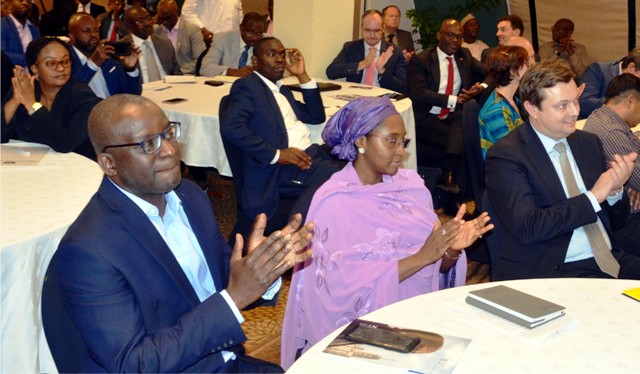Business
NCC Reads Riot Act To Telecom Operators

The National Communication Commission (NCC) has warned that it will not hesitate to deal decisively with telecom operators who exploit consumers by failing to render good quality delivery services that are commensurate to the value of money spent for the services by consumers of telecom services.
NCC’s Director, Consumer Affairs Bureau, Mrs. Felicia Onwuegbuchulam gave the warning while speaking at the 39th Edition of town hall meeting which took place yesterday in Akpabuyo Local Government Area of Cross River State, saying that the era where telecom operators short-changed consumers was over.
Speaking on the theme; “Using Information and Education as a Tool for Consumer Empowerment and Protection,” and stressed that it was through forums of this nature that every stakeholder and telecom consumers get education on contemporary issues which generate interest in the industry with a feed back mechanism that can enable the commission make regulatory interventions that can benefit consumers and service providers.
Onwuegbuchulam who was being represented by Philip Ereten stated that through empowerment and education consumers are fortified with necessary tools to be protected from market exploitation and to make rational and informed decision when making choices of services.
According to her, “Consumer information and education is identified by the commission as one of the most cost-effective mechanisms that guarantees consumer empowerment and education.
She said, “Besides serving as a proactive way of protecting consumers from making wrong choices, it’s also serves as a proactive measure that protect consumers from being exploited against fraud”.
The commission’s public Affairs Director added that to ensure that telecom consumer is Protected, Informed and Educated, (PIE mandate),the commission has developed series of initiative with the main goal of empowering consumers with appropriate information and education that will ensure that their right, privileges and interest are adequately protected stressing that “information is power”.
Speaking earlier at the ceremony, deputy director Consumer Affairs Bureau, Alhaji Ishmail Adedigba who gave reasons for the town hall meeting stated that the program was to enable a tripartite meeting of regulators, operators and consumers with a view to resolving pressing
consumers issues with respect to provision of telecom services.
“As you are aware the commission has been inundated with various complaints such as, unsolicited text messages and calls, failure refused to roll over unused data at expiration of data bundle by service providers.
Friday Nwagbara
Transport
Nigeria Rates 7th For Visa Application To France —–Schengen Visa

Transport
West Zone Aviation: Adibade Olaleye Sets For NANTA President

Business
Sugar Tax ‘ll Threaten Manufacturing Sector, Says CPPE

In a statement, the Chief Executive Officer, CPPE, Muda Yusuf, said while public health concerns such as diabetes and cardiovascular diseases deserve attention, imposing an additional sugar-specific tax was economically risky and poorly suited to Nigeria’s current realities of high inflation, weak consumer purchasing power and rising production costs.
According to him, manufacturers in the non-alcoholic beverage segment are already facing heavy fiscal and cost pressures.
“The proposition of a sugar-specific tax is misplaced, economically risky, and weakly supported by empirical evidence, especially when viewed against Nigeria’s prevailing structural and macroeconomic realities.
The CPPE boss noted that retail prices of many non-alcoholic beverages have risen by about 50 per cent over the past two years, even without the introduction of new taxes, further squeezing consumers.
Yusuf further expressed reservation on the effectiveness of sugar taxes in addressing the root causes of non-communicable diseases in Nigeria.
-

 News2 days ago
News2 days agoDon Lauds RSG, NECA On Job Fair
-

 Niger Delta19 hours ago
Niger Delta19 hours agoPDP Declares Edo Airline’s Plan As Misplaced Priority
-

 Nation21 hours ago
Nation21 hours agoHoS Hails Fubara Over Provision of Accommodation for Permanent Secretaries
-

 Transport22 hours ago
Transport22 hours agoNigeria Rates 7th For Visa Application To France —–Schengen Visa
-

 Sports21 hours ago
Sports21 hours agoSimba open Nwabali talks
-
Niger Delta19 hours ago
Students Protest Non-indigene Appointment As Rector in C’River
-
Niger Delta21 hours ago
Stakeholders Task INC Aspirants On Dev … As ELECO Promises Transparent, Credible Polls
-

 Oil & Energy22 hours ago
Oil & Energy22 hours agoElectricity Consumers Laud Aba Power for Exceeding 2025 Meter Rollout Target

